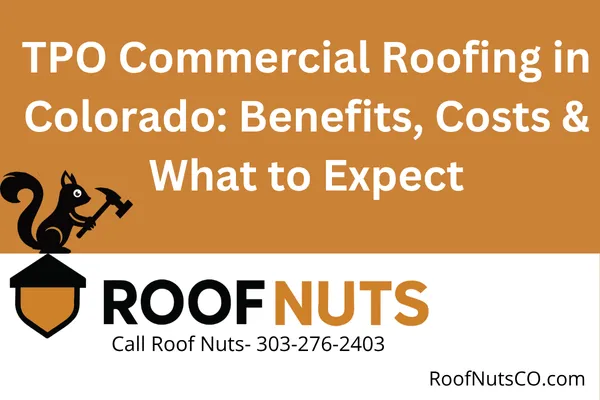
TPO Commercial Roofing in Colorado: Benefits, Costs & What to Expect
TPO Commercial Roofing: What Colorado Property Owners Need to Know
If you’re managing or owning a commercial building in Colorado, you know your roof has to stand up to extreme temperature swings, hail, snow, and sun. That’s why TPO roofing is one of the most trusted solutions in the state.
Here’s what you should know about TPO roofing systems and whether they’re right for your building.
What is TPO Roofing?
TPO (Thermoplastic Polyolefin) is a single-ply membrane roofing system made from a blend of polypropylene and ethylene-propylene rubber.
It’s installed in large sheets and sealed at the seams using heat welding, creating a watertight, flexible, and energy-efficient surface.
Why TPO Works Well in Colorado
TPO membranes are particularly suited for Colorado’s climate:
UV resistance: White TPO reflects heat, which lowers cooling costs and protects the membrane from degradation.
Flexibility: Withstands expansion and contraction caused by freeze-thaw cycles.
Seam strength: Heat-welded seams resist wind uplift and leaks better than adhesives.
Resistant to hail: TPO systems meet FM Global and ASTM impact resistance standards and hold up well in Colorado's hail-prone areas.
Puncture resistance: Ideal for flat roofs with foot traffic or mechanical units.
How TPO Roofing is Installed
There are three main ways TPO can be installed on commercial roofs:
Fully adhered: Glued directly to the insulation or cover board. Offers strong wind uplift protection.
Mechanically fastened: Screwed into the deck and seams heat-welded. This is the most common method.
Ballasted: Loose-laid and held down with gravel or pavers. Less common due to weight and wind concerns.
Each method has specific use cases. A Roof Nuts specialist will recommend the right one based on your building type, local codes, and energy goals.
Cost of TPO Roofing in Colorado
TPO is one of the most cost-effective commercial roofing options, both short and long term.
Installation cost: Around $6–$10 per square foot depending on insulation type, roof complexity, and project size.
Maintenance cost: Low—seams are durable and resistant to punctures.
Energy savings: Reflective TPO reduces heat absorption, cutting AC use during Colorado’s hot summers.
Lifespan and Warranty
TPO roofs can last 20–30 years when installed and maintained properly.
Manufacturers offer warranties ranging from 15 to 30 years, depending on the membrane thickness (commonly 45, 60, or 80 mils).
FAQ: TPO Roofing for Commercial Properties
Is TPO roofing better than EPDM?
TPO reflects more sunlight and is more puncture-resistant, while EPDM is more flexible and UV-stable over time. For most flat roofs in Colorado, TPO is more energy-efficient and durable.
How long does it take to install TPO?
Most medium-sized commercial buildings can be completed in 1–2 weeks depending on tear-off, weather, and the roof’s size and shape.
Can TPO handle hail?
Yes. TPO membranes have proven hail resistance. Roof Nuts installs systems that meet or exceed FM and ASTM hail impact standards.
Call Roof Nuts CO for Expert Commercial Roofing
We’ve installed TPO roofing systems across Colorado—Denver, Colorado Springs, Aurora, Fort Collins, and beyond.
Call 303-276-2403 or visit RoofNutsCO.com for a free roof assessment.
We’ll walk your property, check for damage, and build a plan that meets your budget and performance needs. No pressure. Just expertise.
